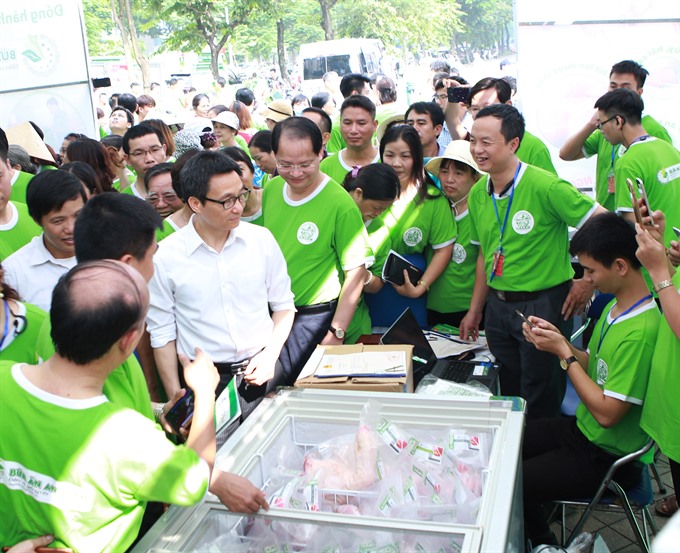 Society
Society

The capital city needs to intensify food safety inspections and investigations, as well as promote the safe cultivation of raw materials and agricultural products, Deputy Prime Minister Vũ Đức Đam said yesterday.
 |
| Deputy Prime Minister Vũ Đức Đam (in white) visits a booth that provides safe food at the launch of a food safety programme in Hà Nội yesterday. — VNA/VNS Photo Hoàng Hùng |
HÀ NỘI — The capital city needs to intensify food safety inspections and investigations, as well as promote the safe cultivation of raw materials and agricultural products, Deputy Prime Minister Vũ Đức Đam said yesterday.
Speaking at the launch of a programme on food safety in Hà Nội, the Deputy PM requested the capital city consider food safety an urgent priority and focus all financial and human resources, equipment and facilities on eliminating unsafe food.
Initiated by the capital city’s health, agricultural and trade departments, in collaboration with the Hà Nội Union of Science and Technology Associations (HUSTA), the four-phase programme will be implemented from 2017 to 2020, aiming to raise awareness and increase responsibility of individuals, households and the wider community in using safe food in daily meals.
During the first phase of the programme, booths that provide safe food will be established at five apartment complexes. They will be extended to 30 apartment complexes by the fourth phase.
Deputy PM Đam said he appreciated the efforts made by the city and concerned authorities in launching the initiative, especially at a time when the spread of unsafe food is threatening the health of consumers more than ever.
“I hope the programme will not only connect food providers and consumers but also educate individuals, households and the community on the importance of having safe food in one’s daily diet,” he said.
Apart from heightening focus on identifying, inspecting and destroying unsafe food, the capital city should also invest more in “developing safe agricultural cultivation areas, widening the application of the Vietnamese Good Agricultural Practices (VietGAP) and similar models, and developing safe food distribution systems,” he added.
In order to ensure that safe meals are delivered to the table of every family, there needs to be close collaboration among the five parties that are the State, scientists, journalists, enterprises, and consumers, according to the programme’s organisers.
This close collaboration will not only help identify unsafe food but also solve difficulties in management, helping to control food quality from the beginning of the supply chain. — VNS




